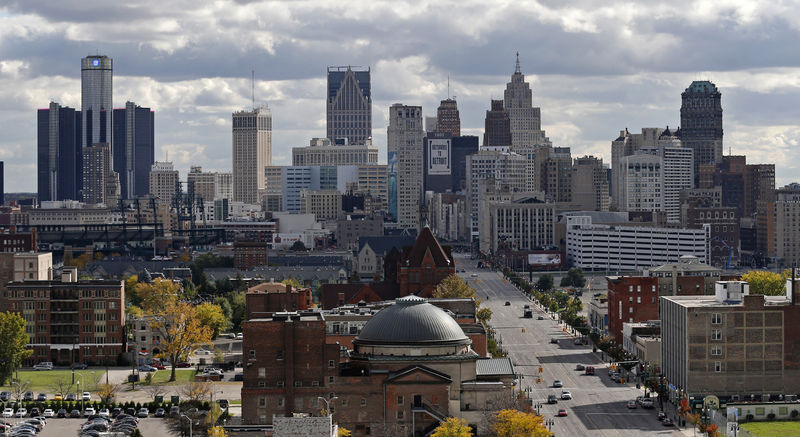 © Reuters. The skyline of Detroit looking south from the midtown area in Detroit, Michigan
© Reuters. The skyline of Detroit looking south from the midtown area in Detroit, MichiganBy Karen Pierog
CHICAGO (Reuters) – Detroit’s latest redemption of bonds sold in 2014 as part of its exit from bankruptcy will result in big savings in future years, city officials said on Friday.
A tender offer Detroit financed through a bond refunding priced on Friday will reduce a spike in debt service by nearly $155 million between fiscal 2025 and 2030, according to the officials.
“Eliminating this debt cliff removes another major roadblock for Detroit’s long-term recovery,” Mayor Mike Duggan said in a statement.
Detroit issued the financial recovery bonds as part of its federal court-approved plan to exit what was then the biggest U.S. municipal bankruptcy, which allowed the city to shed about $7 billion of its $18 billion of debt and obligations. Bond proceeds were used to fund settlements with bond insurers, interest-rate swap providers, city pension funds, as well as to raise money for capital projects.
The city, which has only been paying interest on the financial recovery bonds, launched tender offers starting earlier this year as a way to save money. The upcoming debt cliff is due to principal payments that commence in 2025 around the same time that higher-than-expected city pension contributions start.
“Trying to budget and manage through that would have been quite difficult for the city and maybe even created another financial crisis,” Detroit Chief Financial Officer John Hill said.
While Detroit has begun setting aside money for pensions, credit rating agencies have raised concerns about how the city would address the debt service spike.
In the city’s latest tender offer, which expired Dec. 3, investors returned about $200 million of the nearly $632 million of series 2014B financial recovery bonds that mature in 2044, with the majority tendered at $87 per $100 of bonds.
Earlier this year, $70 million of series 2014C bonds were redeemed by the city, which paid for them with a budget surplus and proceeds from a property sale.
The latest redemption was financed through a nearly $176 million refunding of the 2014 bonds backed by a fifth lien on the city’s distributable state aid revenue. Underwriters priced the taxable bonds through the Michigan Finance Authority on Friday at par with coupons of 4.92 percent in 2039 and 5.02 percent in 2043, achieving a net present value savings of just over $10 million.
On Tuesday, Detroit entered the U.S. municipal market solely under its own junk-rated credit for the first time since its December 2014 bankruptcy exit with $135 million of unlimited-tax, general obligation bonds to fund capital projects.
Michigan’s largest city was able to terminate active post-bankruptcy oversight of its finances in April after concluding three straight fiscal years with balanced budgets.
Fusion Media or anyone involved with Fusion Media will not accept any liability for loss or damage as a result of reliance on the information including data, quotes, charts and buy/sell signals contained within this website. Please be fully informed regarding the risks and costs associated with trading the financial markets, it is one of the riskiest investment forms possible.
Source: Investing.com




























